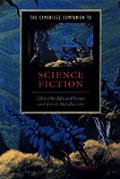
| Publisher: | Cambridge |
| Copyright: | 2003 |
| Printing: | 2004 |
| ISBN: | 0-521-01657-6 |
| Format: | Trade paperback |
| Pages: | 275 |
This volume provides a general introduction to science fiction, its history, and its critical analysis. It's part of the Cambridge Press series of critical companions to literature; just its publication as part of that line says something about how far serious analysis of science fiction has come. Since it's an overview and I already read a lot of SF criticism and analysis, there was a lot in here with which I was already familiar. But it was still worth reading for the step back and the larger picture that comes out of the interplay between the included essays.
The book is divided into three parts: a history of SF, told in four essays covering the historical chronology plus two accompanying essays on films and TV and on editors; a set of essays giving broad overviews of different critical approaches to SF; and a set of essays on particular aspects of SF. The first section is the strongest, but also the most likely to duplicate information that a regular SF reader already knows. The writing style overall was pleasantly approachable, with only a few essays that bogged down in their academic language (Helen Merrick's disappointing essay on gender and Andrew M. Butler's valiant attempt at explaining postmodernism are the two failures that stand out in memory).
The SF history will be old hat to most long-term readers, although Brian Stableford's "pre-history" essay covering the genre before 1926 will probably hold a few surprises. I got a bit bogged down in the long list of French works, but there was a lot there I'd not previously been aware of. Particularly interesting was the history of anti-science writing and the way that's been mingled together with science fiction into a single genre, despite the opposing theme and message. After that essay, the history covers the standard divisions of the pulp and magazine era, the New Wave, and the current era. I enjoyed reading Gary K. Wolfe's essay on the editors who have shaped SF; retracing the steps of the history from the editor side was a good idea, and Wolfe is, as always, a clear and interesting writer.
The critical approach section is very much a cursory overview, but since I'd not given much thought to SF as seen through one particular lens, it was worthwhile reading for me. The mingling of Marxist political analysis and SF's long-term interest in utopias was the most interesting connection, particularly when viewed, as Istvan Csicsery-Ronay, Jr. touches on, from the angle of technology as a source of human liberation. Veronica Hollinger's essay on feminist theory does a good job of picking particular representative works and showing how they are amenable to certain types of analysis (and not just the obvious and well-known ones).
The third section, though, is where I think the average SF reader is going to find the most meat. It's less academic and more focused on picking out a piece of SF, turning it over, and commenting on how it's been used. If this section has a flaw, however, it's that many of the authors too easily slip into the habit of presenting laundry lists of works that use particular themes. This is useful at times for book recommendations, but can feel like a reading assignment rather than an analysis. Joan Slonczewski and Michael Levy's essay on life sciences is a notable example of this problem.
Better are Edward James's essay on utopias and anti-utopias, which works well with the following essay by Ken MacLeod on politics in SF, and the similarly paired essays by Kathryn Cramer on hard SF and Gary Westfahl on space opera. (I found that the essays by authors familiar for previous critical work, such as those four, John Clute, and Gary K. Wolfe, were noticably more enjoyable to read than the essays by people I'd never heard of.) Andy Duncan's essay on alternate histories is worth a mention; I think he deftly handled the standing controversy over alternate history's association with SF and went on to provide a solid overview.
I think the most obvious audience for this book is the scholar who comes to SF without prior experience in the genre. It provides a solid orientation to the major works and running themes, along with a generous helping of specific title recommendations to explore any particular area one might name. For the experienced reader of SF, it's less useful as an orientation and more useful as insight into how other people orient themselves. I learned a few new factual tidbits here and there, but mostly the essays provided insight into the numerous ways other people orient themselves within the genre and the interesting lines of association and focus that they find.
If you're curious about how critical analysis of science fiction is approached, this is a good overview. If you're looking for daring but defended theses, new insights, or book reviews and recommendations, this probably isn't the book you want.
Reviewed: 2008-01-27